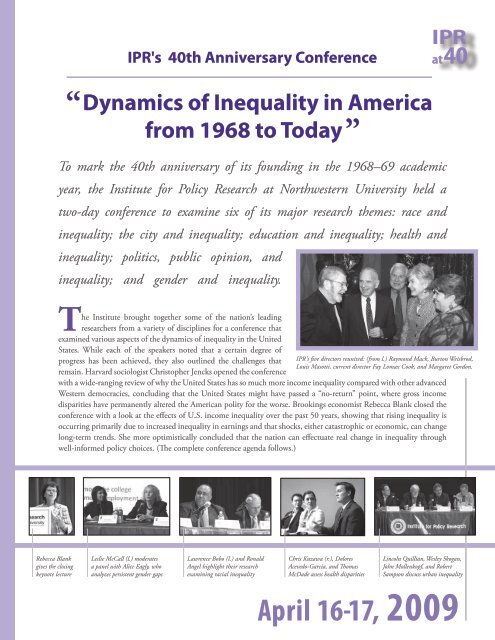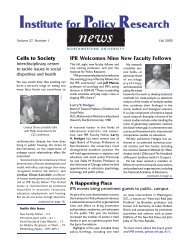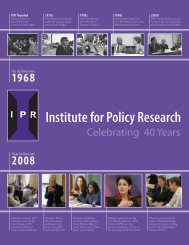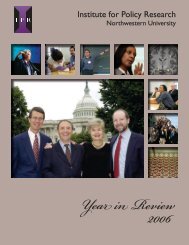pdf - Institute for Policy Research - Northwestern University
pdf - Institute for Policy Research - Northwestern University
pdf - Institute for Policy Research - Northwestern University
Create successful ePaper yourself
Turn your PDF publications into a flip-book with our unique Google optimized e-Paper software.
IPR's 40th Anniversary Conference<br />
IPR<br />
at 40<br />
Dynamics of Inequality in America<br />
from 1968 to Today"<br />
“<br />
”<br />
To mark the 40th anniversary of its founding in the 1968–69 academic<br />
year, the <strong>Institute</strong> <strong>for</strong> <strong>Policy</strong> <strong>Research</strong> at <strong>Northwestern</strong> <strong>University</strong> held a<br />
two-day conference to examine six of its major research themes: race and<br />
inequality; the city and inequality; education and inequality; health and<br />
inequality; politics, public opinion, and<br />
inequality; and gender and inequality.<br />
The <strong>Institute</strong> brought together some of the nation’s leading<br />
researchers from a variety of disciplines <strong>for</strong> a conference that<br />
examined various aspects of the dynamics of inequality in the United<br />
States. While each of the speakers noted that a certain degree of<br />
progress has been achieved, they also outlined the challenges that<br />
remain. Harvard sociologist Christopher Jencks opened the conference<br />
with a wide-ranging review of why the United States has so much more income inequality compared with other advanced<br />
Western democracies, concluding that the United States might have passed a “no-return” point, where gross income<br />
disparities have permanently altered the American polity <strong>for</strong> the worse. Brookings economist Rebecca Blank closed the<br />
conference with a look at the effects of U.S. income inequality over the past 50 years, showing that rising inequality is<br />
occurring primarily due to increased inequality in earnings and that shocks, either catastrophic or economic, can change<br />
long-term trends. She more optimistically concluded that the nation can effectuate real change in inequality through<br />
well-in<strong>for</strong>med policy choices. (The complete conference agenda follows.)<br />
IPR's five directors reunited: (from l.) Raymond Mack, Burton Weisbrod,<br />
Louis Masotti, current director Fay Lomax Cook, and Margaret Gordon.<br />
Rebecca Blank<br />
gives the closing<br />
keynote lecture<br />
Leslie McCall (l.) moderates<br />
a panel with Alice Eagly, who<br />
analyzes persistent gender gaps<br />
Lawrence Bobo (l.) and Ronald<br />
Angel highlight their research<br />
examining racial inequality<br />
Chris Kuzawa (r.), Dolores<br />
Acevedo-Garcia, and Thomas<br />
McDade assess health disparities<br />
Lincoln Quillian, Wesley Skogan,<br />
John Mollenkopf, and Robert<br />
Sampson discuss urban inequality<br />
April 16-17, 2009

















